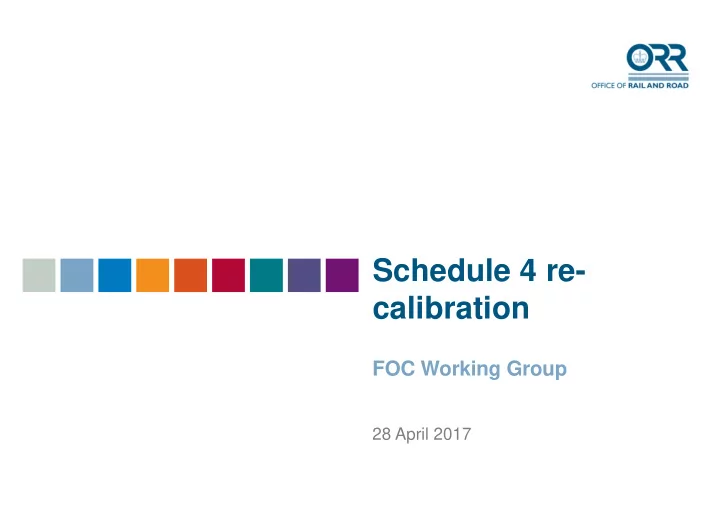

Schedule 4 re- calibration FOC Working Group 28 April 2017
2 Purpose of these sessions ■ To agree the detailed scope of the re-calibration work by June to enable industry deliver the work needed. ■ The focus is on re- calibration not policy i.e. it’s about the specific numbers in the formula and detailed methodology rather than reviewing principles or fundamental aspects of the methodology that underpins the calculations.
3 Recap of where we are ■ In our Dec consultation we set out our proposed priorities for policy work on Schedule 4 during PR18. ■ We asked respondents to submit evidence if arguing for any change to these priorities. ■ A number of issues were raised by respondents regarding the FOC regime (which we summarise as): – Within the scope of the recalibration exercise (and therefore relevant to this WG) • S4 compensation rates are not reflective of possessions disruption costs • Elements of the freight S4 payment rates criteria. – Outwith the scope of the recalibration exercise (but the responses will be considered as part of our policy work) • The need to ensure the freight S4 regime acts as an incentive on Network Rail to plan possessions efficiently and minimise disruption to freight services. • Interaction between Schedules 4and 8 in respect for major disruptions • Improvements to Network Rail Possession planning, in particular Network Rail to be better incentivised to provide more diversionary routes rather then cancellations.
4 The options ■ Today we are going to set out: – The base case for re-calibration. – The other areas the re-calibration could consider along with details of what evidence would be needed to support their recalibration. ■ The base case should be viewed as the default position – it represents the minimum we think needs to happen. ■ Industry support (and data) would be needed to go beyond the base case. Of particular interest would be: – The scale of the issue (ie how big an impact is this having) – The effect on the incentive to Network Rail (ie could re-calibrating this lead to a better incentive on Network Rail).
5 The base case ■ Assumes no change in overall funding other than inflation. ■ Uprate the freight schedule 4 budget and payment rates for inflation to deliver broadly the same level of compensation as in CP5. ■ Identify any issues with contractual wording and if straightforward address.
6 Potential additional areas for re- calibration – based on issues raised by respondents
7 Schedule 4 payment rates are not cost reflective ■ Stakeholders think that current rates do not reflect the costs of disruption faced by FOCs. ■ Current situation : payment rates originally based on cost data supplied by FOCs ■ Some Stakeholders think that current criteria does not reflect all drivers of possession disruption costs. Main circumstances identified, where possession disruption leads to additional costs not triggered by existing criteria: – Reduced terminal times – Impact of multiple route diversions – Additional reverse moves, requiring additional costs eg shunter? – Other?
8 What recalibration would entail ■ Increase in payment rates would need to be funded : - ACS, paid by freight operators - Rebalancing of the package for freight, either within schedule 4 or potentially more widely (“overall impacts”) - Additional government funding . ■ What information is needed to decide whether this needs to be re-calibrated? – Evidence of a systemic difference between compensation payments and FOC possession disruption costs – What impact any change (potentially taken with other changes in freight charges and incentives) would have on freight funding.
9 Claiming compensation for major disruptive incidents ■ Some stakeholders told us: – that incidents of major disruptive events are increasing and are complex and time consuming for FOCs to claim compensation – that this complexity is driven in part by Network Rail’s ability to declare a ‘restriction of use’ after a major disruptive event which means FOCs are unable to easily claim compensation under Schedule 4. – And that Schedule 8 payments are more cost reflective of major disruptive events. ■ Our response: ■ This is not an issue of the applicability of Schedules 4 and 8 issue, but consideration of additional criteria / higher payment rate ‘for very late disruption’
10 NR Possession Planning process ■ Stakeholders told us that Network Rail’s planning process needs to be improved - with right incentives. Main concerns: – Network Rail plans too many possessions too early – Is not incentivised/ work to finding diversionary routes for freight – Is not incentivised to minimise disruption to freight services. ■ PR18 review aims to improve these but we also recognise that processes outside Schedule 4 can support addressing this issue, including potentially better industry planning.
Recommend
More recommend